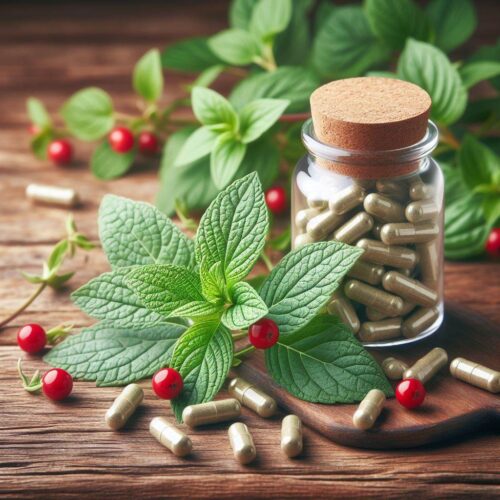Ashwagandha, an ancient herb known for its medicinal properties, has garnered attention for its potential to boost testosterone levels in men. Several studies have shown promising results in this regard.
Testosterone is a crucial hormone that plays a role in fertility, sexual function, bone health, and muscle mass.
A person’s testosterone level will fall naturally with age, but some medical conditions, lifestyle choices, and other factors can influence the amount of this hormone in the body.
In this article, we explore the benefits and research surrounding ashwagandha and its effects on testosterone levels.

What is ashwagandha?
Ashwagandha, also known as Withania somnifera, is an adaptogenic herb used in Ayurvedic medicine for centuries.
It is known for its ability to help the body adapt to stress, enhance stamina, and improve overall well-being.
How does ashwagandha boost testosterone levels?
Reducing stress and cortisol
Studies suggest that ashwagandha can lower cortisol levels, a stress hormone that, when elevated, can negatively impact testosterone production.
By reducing cortisol, ashwagandha may help maintain healthy testosterone levels.
Improving male fertility
Research published in the “Evidence-Based Complementary and Alternative Medicine” journal found that ashwagandha supplementation led to higher testosterone levels and improved sperm count in infertile men.
This suggests potential benefits for male fertility.
Enhancing muscle strength and recovery
A study in the “Journal of the International Society of Sports Nutrition” found that men who took ashwagandha supplements experienced significant increases in testosterone levels, muscle mass, and strength compared to those who didn’t.
This highlights ashwagandha’s potential in supporting muscle recovery and strength.
Studies on ashwagandha and testosterone
Stress and testosterone
A study in the “Indian Journal of Psychological Medicine” involved 57 men with moderate to severe stress.
They took 300 mg of ashwagandha root extract twice daily for eight weeks.
Results showed reduced stress and significantly increased testosterone levels compared to the placebo group.
Male fertility
Research published in “Evidence-Based Complementary and Alternative Medicine” involved 75 infertile men who took 5 grams of ashwagandha daily for three months.
The study found significant increases in testosterone levels and improvements in sperm quality and count.
Strength training
A study in the “Journal of the International Society of Sports Nutrition” examined 57 healthy young men in resistance training.
They took 300 mg of ashwagandha root extract twice daily for eight weeks.
The ashwagandha group saw significant increases in testosterone levels, muscle mass, and strength compared to the placebo group.
How much ashwagandha should I take per day to boost testosterone?
The appropriate dosage of ashwagandha can vary depending on factors such as age, health status, and the specific reason for taking it.
However, typical doses for adults range from 300 mg to 600 mg of standardized extract per day, taken in divided doses.
It’s essential to follow the instructions on the product label or consult with a healthcare professional to determine the right dosage for your individual needs.
Starting with a lower dose and gradually increasing it can help assess tolerance and effectiveness.
Additionally, it’s crucial to use high-quality ashwagandha supplements from reputable sources to ensure safety and efficacy.
Is ashwagandha safe to take?
When taken appropriately and in recommended doses, ashwagandha is generally considered safe for most people.
Ayurvedic medicine has used ashwagandha for centuries without reporting significant side effects.
However, some individuals may experience mild side effects such as digestive upset, drowsiness, or headache, especially when taking high doses.
Additionally, certain groups of people should exercise caution or avoid ashwagandha altogether.
These include pregnant or breastfeeding women, individuals with autoimmune diseases, and those taking medications for thyroid disorders or diabetes.
It’s always best to consult with a healthcare professional before starting any new supplement. Especially if you have underlying health conditions or are taking medications.
Overall, ashwagandha is generally considered safe and well-tolerated for most people when used responsibly and under the guidance of a healthcare provider.
When should I take ashwagandha?
The timing of when to take ashwagandha can vary depending on individual preferences and goals. However, there are some general guidelines:
- Morning: Many people prefer to take ashwagandha in the morning with breakfast or shortly after waking up. This can help provide an energy boost and support stress management throughout the day.
- Before Bed: Some individuals find it helpful to take ashwagandha before bed, as it may promote relaxation and improve sleep quality. This can be particularly beneficial for those who experience stress-related sleep disturbances.
- With Meals: Taking ashwagandha with meals can help improve absorption and reduce the risk of gastrointestinal discomfort. However, this is not necessary, and ashwagandha can be taken on an empty stomach if preferred.
Ultimately, the best time to take ashwagandha depends on your personal preferences and lifestyle.
It’s essential to be consistent with your dosing regimen to experience the full benefits of this adaptogenic herb.
If you’re unsure about the best timing for you, consulting with a healthcare professional can provide personalized guidance based on your individual needs and goals.
What are the other benefits of ashwagandha?
Ashwagandha is a versatile adaptogenic herb known for its wide range of health benefits. Here are some key benefits:
- Reducing stress and anxiety
- Enhancing cognitive function
- Supporting sleep quality
- Boosting immune system
- Managing blood sugar levels
- Supporting heart health
- Enhancing physical performance